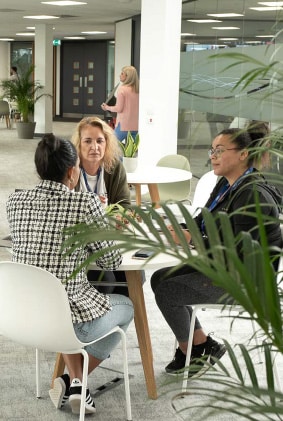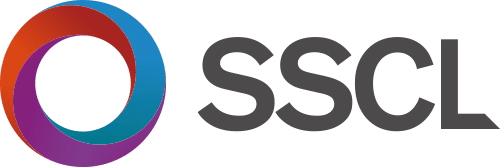
Shared Services Connected Ltd Modern Slavery Statement
2023 / 2024
1. Introduction
Modern slavery is prevalent across the world. Given the hidden nature of the crime, it is almost impossible to understand the full scope and scale of the issue.
At Shared Services Connected Ltd (SSCL), we have a responsibility to ensure there is no modern slavery or human trafficking in our business and in our supply chains. This statement outlines the polices, processes and actions we have taken to understand the potential risks to our business from modern slavery. This statement relates to the financial year ending 31st December 2023 and is in accordance with national laws.
SSCL is absolutely committed to preventing modern slavery and human trafficking in our corporate activities and in our supply chain.
2. Organisational Structure and Supply Chains
SSCL was founded as a joint venture with the Cabinet Office and Sopra Steria in 2013 to provide business support services for Government, Defence and Police clients in the UK public sector.
In 2023, in line with the original joint venture contract, the Cabinet Office agreed to sell its stake to Sopra Steria. SSCL has now become a wholly owned subsidiary of Sopra Steria. Sopra Steria is a European leader in consulting, digital services, and software development, and helps clients drive their digital transformation to obtain tangible and sustainable benefits.
Together, we are proud to be a signatory to the United Nations Global Compact, which includes Principle Four: Labour. We also align with the UN Sustainable Development Goals including Goal 8 – decent work and economic growth.
To ensure we are aligned with the company’s values for an ethical business, we use the EcoVadis Corporate Social Responsibility (CSR) assessment each year so that we can make improvements to our CSR credentials and understand our competitor landscape. We have received a platinum award for the fifth year in a row, progressing from an “Advanced” score to “Outstanding”. We rank in the top 1% of companies assessed against 21 different sustainability criteria, including our response to modern slavery.
This statement covers the activities of SSCL whose registered office is Three Cherry Trees Lane, Hemel Hempstead, Hertfordshire, HP2 7AH in the UK. SSCL employees 3300 people at six Centres of Excellence located in the UK.

3. SSCL’s Approach to Preventing Slavery and Human Trafficking
3.1 Relevant Policies
SSCL is aligned to the following Sopra Steria policies, and we apply SSCL-specific policies where appropriate. These policies define the steps we have taken to prevent modern slavery and human trafficking in our operations and supply chain.
Code of Ethics
Our code underpins our approach to transparency, fairness and loyalty towards our customers, employees, suppliers and others in wider society. The Code of Ethics is aligned to 10 principles of the UN Global Compact including fighting against child labour and exploitation, forced labour or any form of compulsory labour. Sopra Steria provides all employees with access to a whistleblowing process enabling them to report concerns that are contrary to this code including breaches of human rights and human trafficking.
Responsible Procurement Policy
This policy applies to all procurement activities in the UK and requires we adhere to social and ethical standards, and human and labour standards in the procurement of goods and services. Our standard terms and conditions for suppliers also requires them to uphold human and labour rights and legislation (in the UK) and to prevent modern slavery and human trafficking in their own operations and their supply chains.
Sustainability Policy
Sopra Steria’s Sustainability Policy in conjunction with its Framework enables Sopra Steria to be part of a more sustainable economy and community, have more engaged employees and forge better relationships with its stakeholders. This is achieved by aligning its strategy, objectives, policies and practices with the highest standards of sustainability. This includes championing the human and labour rights of its employees and fighting Modern Slavery.
Recruitment and Selection Policy
We only use specified, reputable employment agencies to source labour and always verify the practices of any new agency before accepting workers from that agency and all candidates must go through a verified right to work check. In the UK, a requirement to comply with the Modern Slavery Act 2015 is contained in our supplier contracts.
Equal Opportunities and Diversity Policy
Our commitment to establishing and maintaining a working environment which is free from discrimination, and which values all employees as individuals.
3.2 Due Diligence: Processes and Practices
3.2.1 Within our own operations
SSCL is committed to preventing modern slavery and human trafficking and has policies and processes in place to ensure that our employees are not exposed to exploitation and that they have a safe and supportive working environment. To support this, we have taken the following steps:
- All employees have a contract of employment which sets out rights and obligations arising from their employment, including the notice period needed for them to terminate the contract and leave our employment. Employees are free to serve notice at any time.
- We conduct verification of an employee’s identity and ongoing right to work in the UK.
- We do not withhold any employee’s identity documents or passport during their employment.
- We comply with all legislation in respect of working time and statutory time off, holiday entitlement, time off for personal emergencies, sickness and maternity/paternity leave and minimum rest breaks and periods. We respect the right of individual employees to join a trade union. Where groups of employees elect to be represented by a trade union, we are committed to engaging with trade unions in pursuit of harmonious industrial relations.
- We continue to communicate and train all employees, including contractors, on modern slavery and human trafficking, to ensure employees are aware of their rights and how to spot and report signs of modern slavery.
- We have worked with both the Business Services Association (BSA) and techUK (via Sopra Steria) to share best practice to address modern slavery. We use the results of these engagements to inform our own policies and working practices.
- Since 2020, we have been a Living Wage accredited organisation, and we voluntarily pay all our employees the Real Living Wage including those employed by our Property and Facilities providers. We have also set an expectation in our Supplier Code of Conduct for our suppliers to pay the Living Wage and work towards Living Wage accreditation.
- Any suspected cases of modern slavery or human trafficking can be raised by an employee using the procedures outlined in the Code of Ethics. To date we have not had any instances of an employee reporting a suspected case within our company.

3.2.2 Within our supply chain
We recognise our supply chain contributes the greatest risks for modern slavery and human trafficking and our relationship with the supply base is a critical part of our commitment to eliminating modern slavery and creating a healthy and diverse supply chain. Annually we procure in excess of £120m of goods and services of which 99% is with organisations based in the UK and 1% in the EU.
Our supply chain primarily comprises of organisations within UK and Europe; however, we recognise our upstream supply chain does include countries with a higher risk of modern slavery and/or human trafficking. We mandate our suppliers to prevent and avoid slavery and human trafficking in their supply chains including in these higher risk countries.
We ensure that during all stages of the procurement life cycle we consider modern slavery risks. If there is a suspected case of modern slavery, we will ensure the correct procedures are taken and that the victims are supported. We will work with suppliers through our polices and contracts to deal with any issues on a case-by-case basis.
Our recent Total Facilities Management Tender is a good example of where we worked closely with the prospective bidders to understand their approach to Social Value and to prevent modern slavery, ensuring that the successful bidder was fully committed to working with us on this important topic.
Key categories of spend comprise:
- IT Services.
- Consultancy and Contractors.
Our modern slavery supply chain engagement programme for all suppliers includes:
- An assessment of every new supplier during the onboarding process which includes acceptance of our Supplier Code of Conduct and our standard Terms and Conditions. Our Supplier Code of Conduct mandates that our suppliers comply with a set of obligations which include:
- Prevention of slavery and human trafficking in their own operations and supply chains.
- Ensuring neither they nor their suppliers use child labour and that their employment of young workers adheres to International Labour Organization’s (ILO) standards and local regulations; and
- Confirming they, nor their suppliers, do not use debt bonded labour in their operations.
Using EcoVadis to assess and monitor our key suppliers against 21 different areas related to social, environmental, and ethical responsibility in the supply chain. We gather data on our suppliers’ labour standards and fair business practices within their own organisations and their supply chain. This assessment allows us to identify areas of concern and provides suppliers with action plans for improvements.
- Invoking sanctions regarding a suspected case of modern slavery in our supply chain. We will collaborate with our suppliers to investigate and ensure appropriate procedures are followed within a given timeframe. If we are not satisfied with the result, we will then investigate the termination of business relationships or contracts with suppliers that fail to improve their performance in line with an action plan or where our agreed terms of trading have been breached.
- Reviewing the risks of modern slavery during all stages of the procurement process including tender evaluation, contract award and in-life contract management.
- We continue to be a signatory of the Prompt Payment Code. This sets standards for payment best practice and reduces the risk of late and extended payments. This in turn reduces the pressures on suppliers that could lead to modern slavery. Our standard payment terms are net 30 days. We currently pay 98% suppliers in accordance with its principles.
- Continually monitoring our Supplier Code of Conduct to ensure it is relevant and contains clear obligations for our supplier’s concerning prevention of modern slavery. We also report compliance with the code back to our parent company, Sopra Steria, monthly.
In the past financial year:
- We have continued to add our Modern Slavery Statement to the Government Modern Slavery Statement Registry to ensure complete transparency of our operations.
- As a result of establishing the Social Value Steering Board in late 2022, we have now employed a dedicated Responsible Supply Chain resource to focus on all aspects of Responsible Procurement including modern slavery.
- Moreover, Sopra Steria has conducted an inherent risk analysis of their overall supply chain which identified a potential high risk set of suppliers for further analysis, with support from STOP THE TRAFFIK – a specialist modern slavery charity. They will continue to build on the recommendations and share those with SSCL for information and awareness.
- We have created a new set of standard contract templates which reinforce a supplier’s commitment to prevention of modern slavery and human trafficking.
- We have created a dedicated mailbox to allow suppliers to report any suspicions of modern slavery or human trafficking.
- In 2024, Sopra Steria will be undertaking the Modern Slavery Assessment Tool (MSAT) Survey for 2023 to identify any areas of improvement in our current Modern Slavery governance.


3.3 Training and Awareness-Building
We know how vital it is our employees understand the issue of modern slavery, recognise the signs and can report potential instances within our supply chain.
- We provide targeted, role specific training for the Procurement Team as well as other employees who engage with suppliers to help them understand the risks of human trafficking and how to spot potential dangers.
- We have a mandatory modern slavery training module which is compulsory for all employees including contractors and new starters. This training includes ILO’s Forced Labour Indicators. We also have refresher training in place to ensure focus and awareness.
- During 2024, we will be updating our current mandatory Modern Slavery training course to ensure it remains current and relevant.
4. Performance Indicators
We have in place the following key performance indicators (KPIs). These indicators and activities are reviewed at least annually.
- Supplier engagement:
- 100% of our suppliers to agree with the Supplier Code of Conduct.
- 100% of targeted suppliers to complete EcoVadis sustainability assessment each year.
- Modern slavery training:
- Ensure 100% of all existing and new employees and contractors complete the compulsory modern slavery training.
- Ensure 100% of employees who have roles dealing with suppliers such as the Procurement Team, receive ongoing updates and notifications regarding business & human rights and specifically modern slavery.

5. Responsibility
Responsibility for our initiatives addressing slavery and human trafficking are as follows:
- Human Resources – Director of Human Resources, Sopra Steria Limited for policies related to the prevention of modern slavery and human trafficking in our own operations.
- Chairman Sopra Steria Group SA (France) for the Sopra Steria Group Code of Ethics.
- Procurement – Procurement Director, Sopra Steria Limited for policies related to the prevention of modern slavery and human trafficking in our supply chain.
5.1 Policies
Responsibility for policies is:
- Human Resources – Director of Human Resources, Sopra Steria Limited. For policies related to the prevention of slavery and human trafficking in our own operations.
- Chairman Sopra Steria Group SA (France) for the Sopra Steria Group Code of Ethics.
- Procurement – Procurement Director, Sopra Steria Limited. For policies related to the prevention of slavery and human trafficking in our supply chain.
5.2 Due Diligence
In SSCL, the Human Resources Team are responsible for ensuring due diligence checks are undertaken during all stages of employment from initial recruitment onwards.
In our procurement and supply chain management activities, the Procurement Team are responsible for undertaking due diligence and for such activities related to modern slavery and human trafficking they receive input from other parts of the business including Legal, HR and Sustainability.
6. Board Approval
SSCLs Board of Directors has approved this statement for the Financial Year ending on 31st December 2023.
Director’s name: David Morris
Date: 17-Apr-24
